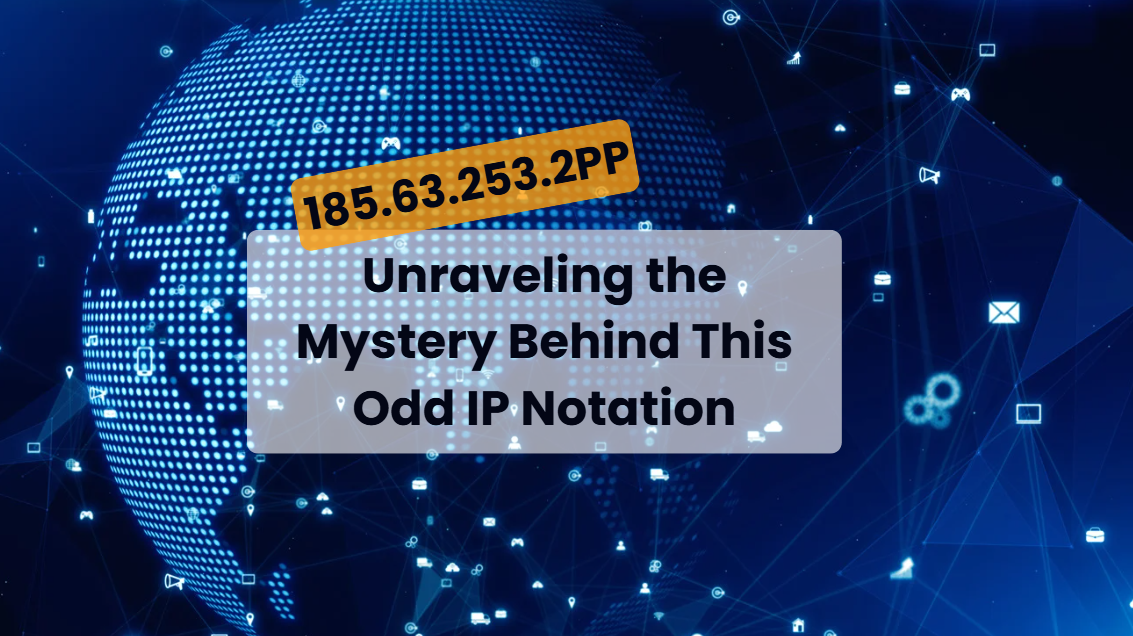Ever stumble upon a term like “185.63.253.2pp” in your server logs, analytics, or online forums and scratch your head? You’re not alone. In the complex world of networking and cybersecurity, unusual strings like this pop up, leaving many wondering what they signify and if they pose a threat. Let’s break down what this cryptic notation likely means and what you need to know.
Decoding the Format: IP Address or Something Else?
At its core, 185.63.253.2 is a valid IPv4 address. Public WHOIS databases show it belongs to a block typically associated with European data centers or hosting providers. This part is standard.
The confusion lies in the “pp” suffix. This isn’t part of any official IP address structure. Its presence immediately signals that “185.63.253.2pp” isn’t a standard IP. Instead, the “pp” is almost certainly an addition, pointing towards several possible explanations:
-
Proxy or Port Indicator: Tech professionals sometimes use shorthand like “pp” to denote a specific Proxy Port or protocol configuration. It could signify a private routing setup.
-
Peer-to-Peer (P2P) Tag: In certain file-sharing or decentralized networks, nodes might be labeled with extra characters. “pp” could loosely reference P2P activity.
-
Tracking or Obfuscation Tactic: Less scrupulous actors (like shady ad networks or botnet operators) might append letters like “pp” to IPs within URLs or tracking scripts to mask origins or create unique identifiers for monitoring traffic.
-
Simple Typo or Malicious Obfuscation: It could be a user error (e.g., accidentally adding characters) or a deliberate attempt to create a confusing string that bypasses security filters or disguises a malicious link.
The Crucial Question: Is 185.63.253.2pp Safe?
Proceed with significant caution. While the base IP (185.63.253.2) might be part of legitimate hosting infrastructure, the unusual “pp” suffix raises red flags. Here’s why:
-
Non-Standard Format: Legitimate traffic sources rarely use such modified notations.
-
Botnet & Spam Associations: IPs within this range (like
185.63.253.2) frequently appear in cybersecurity reports linked to botnet activity, spam relays, or credential stuffing attacks. -
Potential for Mischief: It could indicate attempts at unauthorized access, web scraping, port scanning, or be part of referrer spam hitting your analytics.
-
Phishing/Spoofing Risk: The format could be used in deceptive links attempting to mimic something legitimate.
What This Means for Website Owners & SEO Professionals
If “185.63.253.2pp” (or similar variants) appears in your Google Analytics as a referrer source, it’s almost certainly referrer spam. These bots generate fake traffic to appear in your reports, hoping you’ll visit their source (don’t!). You might also see it in server logs indicating suspicious access attempts.
Here’s Your Action Plan:
-
Investigate the Core IP:
-
Run a reverse IP lookup (e.g., via MXToolbox, WhatIsMyIPAddress).
-
Check the IP (
185.63.253.2) on security platforms like VirusTotal or AbuseIPDB for reported malicious activity. -
Perform a WHOIS lookup (using ARIN, RIPE NCC) to identify the owning network.
-
-
Block Suspicious Traffic:
-
Firewall Rules: Block the specific IP (
185.63.253.2) at your server firewall or via your hosting control panel. -
.htaccess (Apache): Add
Deny from 185.63.253.2. -
Analytics Filtering: Create filters in Google Analytics to exclude known spam referrers containing this pattern.
-
-
Enhance Overall Security:
-
Monitor Logs: Regularly review server access logs for unusual activity spikes or repeated access from suspicious IP ranges.
-
Implement Bot Mitigation: Use CAPTCHAs, rate limiting, or services like Cloudflare to challenge suspicious bots.
-
Keep Software Updated: Ensure your CMS, plugins, and server software are patched against known vulnerabilities that bots exploit.
-
Robots.txt: While not foolproof for malicious bots, ensure your
robots.txtclearly defines what legitimate crawlers should access.
-
The Bottom Line
“185.63.253.2pp” is best understood as a non-standard notation built around a real IP address, with the “pp” suffix being the critical anomaly. While the base IP might be part of legitimate infrastructure, the specific format “185.63.253.2pp” strongly suggests association with bot activity, potential obfuscation, or tracking. Treat it as a security signal.
Don’t panic if you see it, but do take proactive steps: investigate the core IP, block it if malicious activity is confirmed, and bolster your site’s defenses against unwanted traffic. Staying vigilant about unusual entries in your logs and analytics is key to maintaining a secure and healthy online presence.

